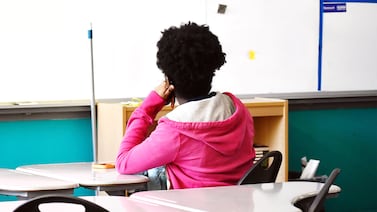Sign up for Chalkbeat Tennessee’s free daily newsletter to keep up with statewide education policy and Memphis-Shelby County Schools.
Seven months after Gov. Bill Lee’s first universal school voucher bill died over disagreements within the legislature’s Republican supermajority, GOP leaders were unified as they introduced new legislation Wednesday.
Senate and House majority leaders filed identical bills to create Education Freedom Scholarships that would give $7,075 each in public funding for a private education for up to 20,000 Tennessee students, beginning next fall. The proposal was the result of months of negotiations with the governor’s office.
Recipients in grades 3-11 would be required to take a national or state standardized achievement test to track the program’s effectiveness.
In an effort to garner support among public school advocates, the proposal calls for giving every public school teacher a one-time $2,000 bonus. It also would redirect 80% of tax revenues from Tennessee’s four-year-old sports betting industry to help pay for a growing backlog of school construction and maintenance needs, especially for emergencies and the state’s 38 rural counties designated as distressed or at risk.
The plan is still likely to face opposition from Republicans in rural areas, which typically don’t have access to private schools and could eventually lose funding for their local public schools. But in a statement, the governor said he looks forward to delivering on his promise for more education choices for parents.
“What we’re doing is taking the next step on a piece of legislation that we worked on last year, didn’t finish, worked on all summer, and now it’s ready,” he told reporters later. “So we’re committed to making sure that parents in this state have choices as it relates to where their child is educated.”
Lee also said he has no plans to call a special legislative session in January to deal exclusively with the voucher proposal before the legislature convenes for regular business on Jan. 14. He added, however, that he will “work with the legislature” on the best path forward for passing his plan.
Both Lt. Gov. Randy McNally and House Speaker Cameron Sexton issued statements of support for the new proposal.
The bills were the first legislation introduced for the next General Assembly, signaling the governor’s intention to make the issue his top legislative priority for a second straight year.
The proposal arrived one day after pivotal elections in which vouchers were an issue in numerous legislative races across Tennessee and on the ballot in other states. In Tennessee, Republicans easily retained their grip on both legislative chambers and it appeared unlikely that vouchers were a major factor in the results.
Failed ballot measures in Colorado, Kentucky, and Nebraska showed voters there appear wary of spending public dollars on private schools.
Tennessee Democrats criticized the new proposed legislation as out of touch with what’s happening across the nation.
“Even voters in red states rejected vouchers in every single place it was on the ballot yesterday,” said Sen. Jeff Yarbro, a Nashville Democrat. “When states have fallen for this con job, like in Arkansas, around 95% of the vouchers go to families who already were paying for private schools.
“This plan would just transfer taxes paid by all Tennesseans to wealthier families in bigger cities,” Yarbro said.
“Same scam, different language,” added Rep. John Ray Clemmons, who chairs the House Democratic caucus.
He said the testing provision is weak and gives participating private schools broad leeway about which national tests to use, while public schools continue to administer some of the most stringent annual state assessments in America.
“It’s giving these private schools taxpayer money and the freedom to do whatever they want. I wouldn’t call it real accountability,” said Clemmons, also a Nashville Democrat.
A revised bill was expected from Lee’s administration
Lee had vowed to return with another statewide voucher plan for 2025 when his 2024 proposal sputtered in committees this spring after Senate and House negotiators couldn’t agree on the details.
Contributing to the impasse were disputes about testing requirements for private school voucher recipients and public school students; the House’s desire to add massive funding incentives for public schools including building maintenance and teacher benefits; and the insistence of the Senate’s bill’s sponsor to create a statewide open enrollment program for public schools.
The latest bill ditched the open enrollment provision after Sen. Jon Lundberg of Bristol, the education committee chairman who sponsored the 2024 bill in his chamber, was defeated in his Republican primary race in August.
The state already has $144 million set aside for the program in this year’s budget — a consolation prize to Lee, who said the money showed the legislature’s clear intent to approve a universal voucher bill in 2025.
Last month, the governor declined to dip into that pot of untapped money or the state’s record-high rainy day fund of $2.15 billion to help clean up widespread destruction caused by Hurricane Helene flooding in northeast Tennessee. Instead, he rolled out a loan program to help impacted counties with cleanup costs until federal emergency funding arrives.
Meanwhile, the governor kicked off his annual budget hearings this week to hear from the heads of state agencies as his administration fashions the state’s next spending proposal.
Economists have predicted either declines or near zero growth in Tennessee’s overall tax collections in 2025, leaving fewer resources for new initiatives or existing priorities.
Details are finally unveiled
Specifically, the voucher proposal would offer state-funded scholarships for students attending state-accredited private schools in Categories I-III, which require teachers to hold a bachelor’s degree and be certified to teach certain subjects. Students attending independent or church-related home schools would not be eligible to participate.
The first 10,000 scholarships would be reserved for families at or below 300% of the income limit to qualify for free or reduced price lunch, those who have children with disabilities, or students who are eligible for the state’s current Education Savings Account voucher program.
The public funding they receive would be tax-exempt.
Students with disabilities would not be guaranteed individualized education plans, as they are in public schools.
Sponsors say the bill also guarantees state funding for each school district will not decrease if students leave their public schools to participate in the voucher program.
“After countless hours of conversations with parents, teachers, administrators, and other stakeholders on the best path forward, this bill strikes the right balance,” said House Majority Leader William Lamberth, of Portland.
But Clemmons, who chairs the House Democratic caucus, called the proposal an affront.
“It’s offensive to me that we’re tying school construction dollars and teacher pay yet again to a voucher scam,” he said. “We should be doing those things anyway. And our education policies should be designed to benefit student outcomes and ensure our students have an opportunity to succeed in life, not fulfilling promises to special interests.”
EdTrust of Tennessee, an advocacy group that seeks to improve education equity, took issue with any suggestion that the new plan won’t affect public school funding or performance.
“Tennessee’s public education system has made great strides, scoring our highest graduation rates to date, and seeing marked improvement in student achievement after the pandemic,” the group said in a statement. “Diverting funds now risks unraveling this progress, affecting rural and underserved communities most severely, where private school options are limited or nonexistent.”
The governor successfully pushed for a 2019 law to create a smaller voucher program in Nashville and Memphis, which has since expanded to Chattanooga. The program has 3,550 enrollees in its third year, still below the 5,000-student cap, according to data from the state education department.
The state comptroller’s first report to lawmakers on that “pilot” program’s effectiveness is due Jan. 1, 2026.
Marta Aldrich is a senior correspondent and covers the statehouse for Chalkbeat Tennessee. Contact her at maldrich@chalkbeat.org.







